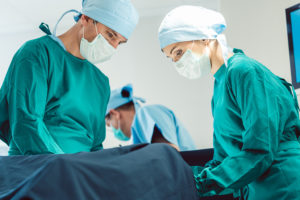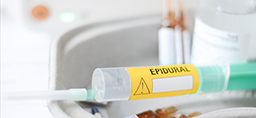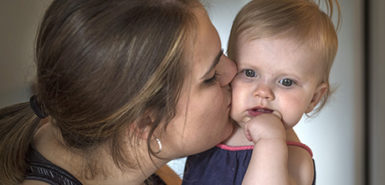
The rate of C-section deliveries in the U.S. has jumped significantly in recent years, particularly since the mid 1990s.
In 1996, about 1 in 5 children were delivered by C-section.
By 2017, this method accounted for about 1 in 3 deliveries, according to the Centers for Disease Control and Prevention.
It’s now essential for expectant moms to be well-informed about all facets of C-section delivery—including the potential risks.
David Colombo, MD, director of maternal fetal medicine at Spectrum Health, talked recently about some of the risks of a C-section delivery, as well as discussing what women can expect before, during and after the delivery.
What are some possible complications of C-sections for mom and baby?
For the mother, the most common compilations include bleeding and infection, Dr. Colombo said.
Mothers undergoing a second, third or subsequent C-section may face an increased risk of placenta accreda, which is when the placenta gets stuck.
“There’s also the risk to damage of the bowel or bladder or surrounding organs,” Dr. Colombo said. “For the baby, we don’t believe there is any increased risk with a C-section versus a vaginal delivery.”
How common are infections after C-sections? What signs of infection should you watch for, and are there any prevention methods?
Infections occur in 1-2 percent of C-sections, typically within the uterus, belly or incision, Dr. Colombo said. Risk factors for infections include obesity and preexisting conditions such as diabetes.
What should women watch for, in terms of infection?
Fever, changes in the skin around the incision, leaking fluids from the incision or abdominal pain.
What can be done to prevent infection?
“To prevent (infection), we give antibiotics prior to the C-section taking place,” Dr. Colombo said.
Women with a penicillin allergy also face a higher risk of infection.
“When giving antibiotics, we adjust the type we give to women based on their weight and allergies,” the doctor said. “If a woman is unsure if she has a penicillin allergy, she should talk to an allergist to get tested.”
Prior to surgery, women should shower with antibacterial soap to prevent infection.
“Also, we encourage women not to shave any hair prior to surgery, because it increases the infection rate,” Dr. Colombo said.
How long can you expect bleeding to last after a C-section? What should you do if bleeding lasts longer than anticipated?
Bleeding usually ends after a few weeks. “If you’re having continued bleeding, you should get checked out by your OB,” Dr. Colombo said.
How soon can you breastfeed after a C-section? Will painkillers or prescription meds affect your breast milk?
You can breastfeed immediately, Dr. Colombo said.
“We don’t recommend taking certain medications like Tylenol with codeine,” he said. “Your provider will know which medicines to avoid and counsel you appropriately.”
In general, how soon can you have sex after a C-section? How long should you wait before trying to conceive again?
Doctors usually tell patients to wait a month after any delivery before having sex. Before trying to conceive again, it’s recommended to wait a year post C-section. This helps lower the risk of complication, Dr. Colombo said.
“There’s slightly higher risk of complications if a woman were to get pregnant within a year of having a C-section,” he said.
How soon after a C-section can you exercise? Are there certain recommended exercises, or exercises that should be avoided?
Some people can exercise right away. Some cannot.
“This really depends on a woman’s fitness level,” Dr. Colombo said.
“I encourage patients to listen to their bodies and be careful not to overdo it,” he said. “Strenuous exercise, such as lifting heavy weights, should be avoided for the first month. I recommend walking and using a stationary bike to start a few weeks after a C-section, if patients are feeling up to it.”
When do most women get their periods back after a C-section?
This depends on breastfeeding. If a mom is exclusively breastfeeding, it may be a while before her period returns.
Every woman is different, Dr. Colombo said. Even height and weight can play a factor.
“If a woman is not breastfeeding, she can expect her period to return within the first three months of her baby’s birth,” the doctor said. “It’s important to note: Woman can get pregnant in the first month, even if they’re breastfeeding.”
Birth control methods can also influence the return of a period. If a mom is on the shot, for example, it could be a year before her period returns, he said.
 /a>
/a>
 /a>
/a>
 /a>
/a>
Women who are expecting a Cesarean can also take the Cesarean Class that I teach at Spectrum Health Healthier Communities prior to their delivery, which can help prepare them and their support person for their delivery experience!